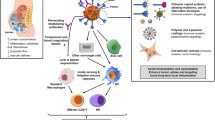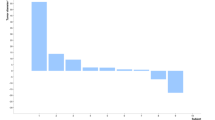Abstract
A cohort study was designed to evaluate the efficiency of gene transfer and whether biological activity from the expressed therapeutic gene resulted after administration of a recombinant adenovirus containing the human wild-type p53 (p53wt) gene (rAd-p53 SCH 58500). The cohort study was conducted in five trial subjects with recurrent ovarian cancer. Each trial subject received multiple cycles of rAd-p53 SCH 58500, each cycle comprised of doses of 7.5 × 1013 particles on each of five consecutive days. Subjects were treated with rAd-p53 SCH 58500 alone during Cycle 1 and in combination with gemcitabine during the subsequent cycles. Both tumor biopsies and peritoneal aspirates were collected and evaluated for gene transfer and evidence of the biological activities of the expressed p53wt gene. Using quantitative PCR and RT-PCR, and in situ PCR, gene transfer and expression were documented in tumor biopsies (four of five patients) collected from Cycle 1. Furthermore, upregulation of p21/WAF1, bax and mdm-2, and downregulation of survivin were observed in these same tumor biopsy samples, suggesting that intraperitoneal administration of rAd-p53 SCH 58500 leads to detectable p53 biological activity in target tumor tissue. In addition, gene transfer and its expression were observed in cells obtained from peritoneal aspirates. These fluids were mainly comprised of polymorphonuclear neutrophils, indicating that successful gene transfer can be achieved by multiple cycle intraperitoneal administration of recombinant adenovirus.
This is a preview of subscription content, access via your institution
Access options
Subscribe to this journal
Receive 12 print issues and online access
$259.00 per year
only $21.58 per issue
Buy this article
- Purchase on Springer Link
- Instant access to full article PDF
Prices may be subject to local taxes which are calculated during checkout









Similar content being viewed by others
References
Dummer R, Bergh J, Karlsson Y, et al. Biological activity and safety of adenoviral vector-expressed wild-type p53 after intratumoral injection in melanoma and breast cancer patients with p53-overexpressing tumors. Cancer Gene Ther. 2000;7:1069–1076.
Schuler M, Rochlitz C, Horowitz JA, et al. A phase I study of adenovirus mediated wild type p53 gene therapy in patients with advanced non-small cell lung cancer. Hum Gene Ther. 1998;15:1750–1758.
Schuler M, Herrmann R, De Greve JL, et al. Adenovirus-mediated wild-type p53 gene transfer in patients receiving chemotherapy for advanced non-small-cell lung cancer: results of a multi-center phase II study. J Clin Oncol. 2001;19:1750–1758.
Kuball J, Wen SF, Leissner J, et al. Successful adenovirus –mediated wild-type p53 gene transfer in patients with bladder cancer by intravesical vector instillation. J Clin Oncol. 2002;20:957–965.
Ring E, Nonaka-Wong S, Horowitz JA, et al. Gene therapy of colorectal liver metastases using a recombinant adenovirus encoding wt p53 (SCH 58500) via hepatic artery infusion: a phase I study. Abstract. ASCO, 1998.
Buller RE, Shahin MS, Horowitz J, et al. Long term follow-up of patients with recurrent ovarian cancer after Ad p53 gene replacement with SCH 58500. Cancer Gene Ther. 2002;9:567–572.
Buller RE, Runnebaum IB, Karlan B, Horowitz JA, et al. A phase I/II trial of rAd-p53 (SCH 58500) gene replacement in recurrent ovarian cancer. Cancer Gene Ther. 2002;9:553–566.
Nemunaitis J, Swisher SG, Timmons T, et al. Adenovirus-mediated p53 gene transfer in sequence with cisplatin to tumors of patients with non-small-cell lung cancer. J Clin Oncol. 2000;18:609–622.
Albelda SM, Wiewrodt R, Sterman DH . Gene therapy for lung neoplasms. Clin Chest Med. 2002;23:265–277.
Alvarez RD, Barnes MN, Gomez-Navarro H, et al. A cancer gene therapy approach utilizing an anti-erbB-2 single-chain antibody-encoding adenovirus (AD21): a phase I trial. Clin Cancer Res. 2000;6:3081–3087.
Crystal RG, Mcelvaney NG, Rosenfeld MA, et al. Administration of an adenovirus containing the human CFTR cDNA to the respiratory tract of individuals with cystic fibrosis. Nat Genet. 1994;8:42–51.
Sterman DH, Treat J, Litzky LA, et al. Adenovirus-mediated herpes simplex virus thymidine kinase/ganciclovir gene therapy in patients with localized malignancy: results of a phase I clinical trial in malignant mesothelioma. Hum Gene Ther. 1998;9:1083–1092.
Hasenburg A, Tong XW, Fischer DC, et al. Adenovirus-mediated thymidine kinase gene therapy in combination with Topotecan for patients with recurrent ovarian cancer: 2.5-year follow-up. Gynecol Oncol. 2001;83:549–554.
Benihoud K, Saggio I, Opolon P, et al. Efficient repeated adenovirus-mediated gene transfer in mice lacking both tumor necrosis factor alpha and lymphotoxin α. J Virol. 1998;72:9514–9525.
Dong JY, Wang D, Van Ginkel FW, et al. Systematic analysis of repeated gene delivery into animal lungs with a recombinant adenovirus vector. Hum Gene Ther. 1996;7: 319–331.
Ozbun MA, Butel JS . Tumor suppressor p53 mutations and breast cancer: a critical analysis. Adv Cancer Res. 1995;66:71–141.
Selter H, Montenarh M . The emerging picture of p53. Int J Biochem. 1994;26:145–154.
Miyashita T, Krajewski S, Krajewska M, et al. Tumor suppressor p53 is a regulator of bcl-2 and bax gene expression in vitro and in vivo. Oncogene. 1994;9:1799–1805.
Miyashita T, Reed JC . Tumor suppressor p53 is a direct transcriptional activator of the human bax gene. Cell 1995;80:293–299.
Somasundaram K, El-Deiry WS . Tumor suppressor p53: regulation and function. Frontiers Biosci 2000;5:d424–d437.
El-Deiry WS, Harper JW, O'connor PM, et al. WAF1/CIP1 is induced in p53-mediated G1 arrest and apoptosis. Cancer Res. 1994;54:1169–1174.
El-Deiry WS, Tokino T, Velculescu VE, et al. WAF1, a potential mediator of p53 tumor suppression. Cell 1993;75:817–825.
Kitanaka C, Namiki T, Noguchi K, et al. Caspase-dependent apoptosis of COS-7 cells induced by Bax overexpression: differential effects of Bcl2 and Bcl-xL on Bax-induced caspase activation and apoptosis. Oncogene. 1997;15:1763–1772.
Chen Cy, Oliner Jd, Zhan Q, et al. Interactions between p53 and MDM2 in a mammalian cell cycle checkpoint pathway. Proc Natl Acad Sci. 1994;91:2684–2688.
Oliner JD, Pietenpol JA, Thiagalingam S, et al. Oncoprotein MDM2 conceals the activation domain of tumor suppressor p53. Nature 1993;362:857–860.
Wen SF, Xie L, Mcdonald M, et al. Development and validation of sensitive assays to quantitate gene expression after p53 gene therapy and paclitaxel chemotherapy using in vivo dosing in tumor xenograft models. Cancer Gene Ther. 2000;7:1469–1480.
Wills KN, Maneval DC, Menzel P, et al. Development and characterization of recombinant adenoviruses encoding human p53 for gene therapy of cancer. Hum Gene Ther. 1994;5:1079–1088.
Huyghe BG, Liu X, Sutjipto S, et al. Purification of a type 5 recombinant adenovirus encoding human p53 by column chromatography. Hum Gene Ther. 1995;6:1403–1416.
Maizel JV Jr, White DO, Scharff MD . The polypeptides of adenovirus. I. Evidence for multiple protein components in the virion and a comparison of types 2, 7A, and 12. Virology 1968;36:115–125.
Shahin MS, Hughes JH, Sood AK, et al. The prognostic significance of p53 tumor suppressor gene alterations in ovarian carcinoma. Cancer 2000;89:2006–2017.
Grace M, Xie L, Musco ML, et al. The use of laser scanning cytometry to assess depth of penetration of adenovirus p53 gene therapy in human xenograft biopsies. Am J Pathol. 1999;155:1869–1877.
Mirza A, McGuirk M, Hockenberry T, et al. Human survivin is negatively regulated by wild-type p53 and participates in p53-dependent apoptotic pathway. Oncogene 2002;21:2613–2622.
Boylay JL, Perruchoud AP, Reuter J, et al. p21 gene expression as an indicator for the activity of adenovirus-p53 gene therapy in non-small cell lung cancer patients. Cancer Gene Ther. 2000;7:1215–1219.
Bursch W, Kleine L, Tenniswood M . The biochemistry of cell death by apoptosis. Biochem Cell Biol. 1990;68:1071–1074.
Stallwood Y, Fisher KD, Gallimore PH, Mautner V . Neutralisation of adenovirus infectivity by ascitic fluid from ovarian cancer patients. Gene Ther. 2000;7:637–643.
Molan-Kimber KL, Sterman DH, Chang M, et al. Impact of preexisting and induced humoral and cellular immune responses in an adenovirus-based gene therapy phase I clinical trial for localized mesothelioma. Hum Gene Ther. 1998;14:2121–2133.
Acknowledgements
We thank the patients and their families for their participation in this bioanalytical cohort of the trial. We thank Michelle Kerin and Melanie Hattermann for the tremendous effort they put in coordinating study samples. We would also like to thank Dr. Suxing Liu for her helpful discussion of the survivin data.
Author information
Authors and Affiliations
Corresponding author
Rights and permissions
About this article
Cite this article
Wen, S., Mahavni, V., Quijano, E. et al. Assessment of p53 gene transfer and biological activities in a clinical study of adenovirus-p53 gene therapy for recurrent ovarian cancer. Cancer Gene Ther 10, 224–238 (2003). https://doi.org/10.1038/sj.cgt.7700562
Received:
Published:
Issue Date:
DOI: https://doi.org/10.1038/sj.cgt.7700562
Keywords
This article is cited by
-
Expression of survivin mRNA in gallbladder cancer: a diagnostic and prognostic marker?
Tumor Biology (2014)
-
Dendritic cells engineered to express CD40L continuously produce IL12 and resist negative signals from Tr1/Th3 dominated tumors
Cancer Immunology, Immunotherapy (2006)
-
A comprehensive assessment of p53-responsive genes following adenoviral-p53 gene transfer in Bcl-2-expressing prostate cancer cells
Oncogene (2004)
-
Preclinical evaluation of a class of infectivity-enhanced adenoviral vectors in ovarian cancer gene therapy
Gene Therapy (2004)
-
Intraperitoneal chemotherapy for ovarian cancer
Current Oncology Reports (2003)



